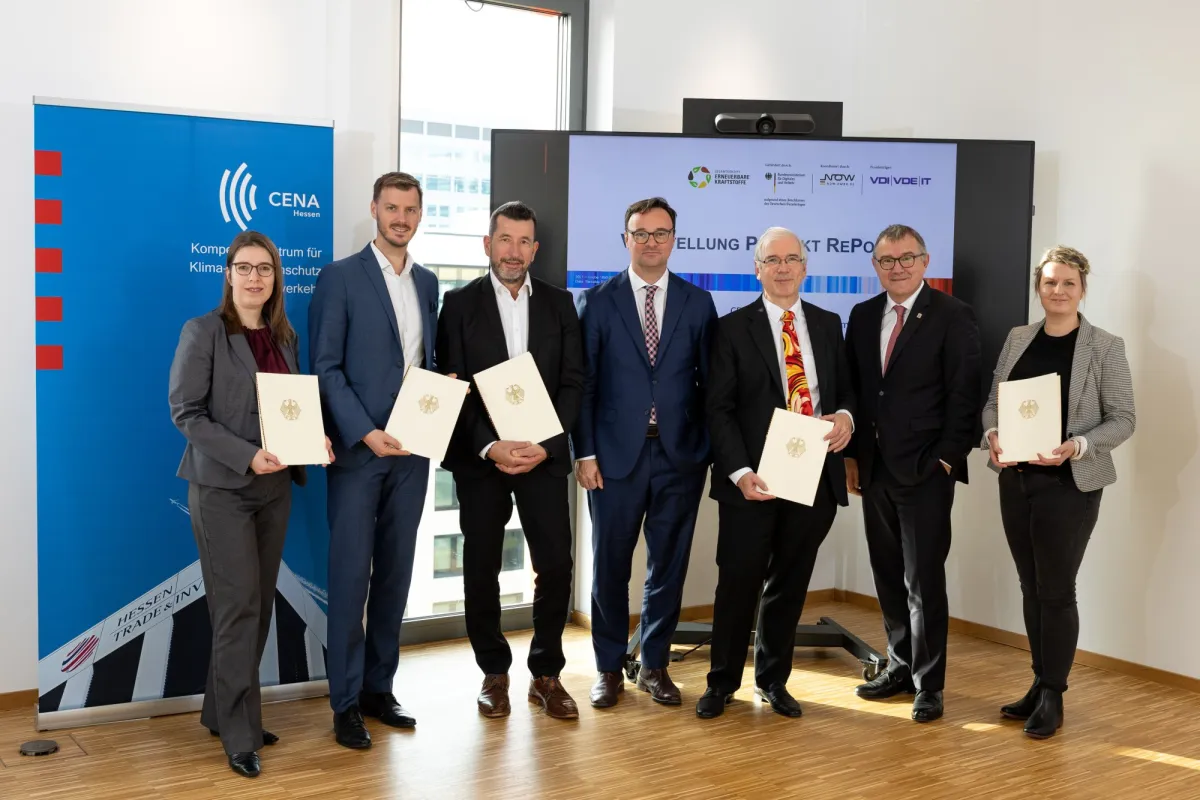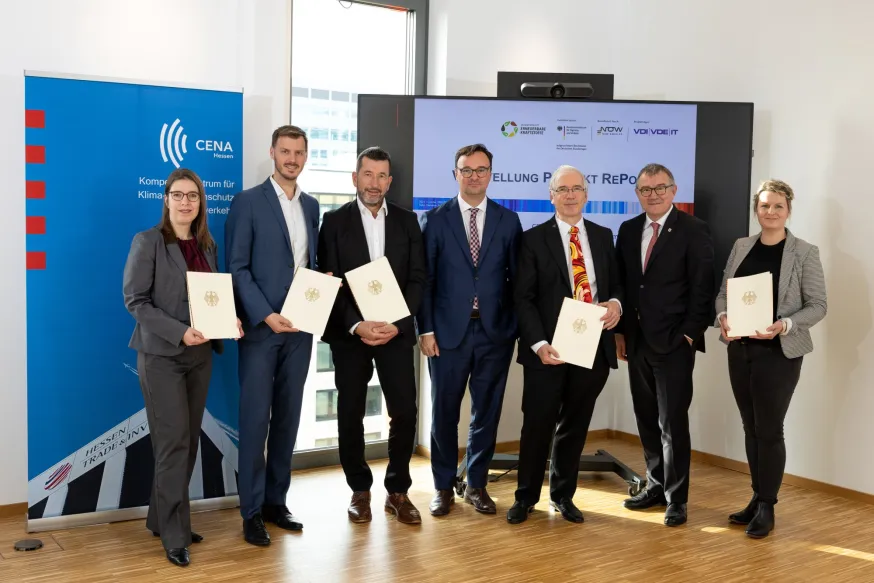
Projekte
3.4 million euros funding commitment for RePoSe e-fuel project in Hesse
Press release of Hessen Trade & Invest GmbH Wiesbaden, November 17, 2022 - Industriepark Höchst (IPH) will be the first site to demonstrate how the fluctuating availability of green electricity affects the production of CO2-neutral power-to-liquid (PtL) fuels. To this end, the Competence Center for Climate and Noise Protection in Aviation (CENA Hessen) is docking its RePoSe (Real-time Power Supply for e-fuels) project with Ineratec GmbH's project at the industrial park.

For the RePoSe R&D project, CENA Hessen and its project partners were able to acquire federal funding of around 3.4 million euros from the German Federal Ministry of Digital Affairs and Transport (BMDV). For the co-financing of the CENA project parts that are not covered by federal funding, the state of Hesse is contributing its own funds of up to 1.25 million euros to the research project.
"We have set ourselves the goal of producing at least 200,000 metric tons of sustainable kerosene per year for German air traffic by 2030," said Oliver Luksic, Parliamentary State Secretary to the Federal Minister of Digital Affairs and Transport at the handover ceremony. "We expect the RePoSe project to provide a boost for the urgently needed market ramp-up of electricity-based fuels and new important insights into the technical conditions required for this."
"In many respects, Hesse is not only a pioneer in noise abatement, but also sets nationwide standards for environmental and climate protection in aviation. Minister Tarek Al-Wazir recognized the potential of electricity-based fuels at an early stage. I am all the more pleased that our work is now being honored with federal funding," said Ministerialdirigent Mr. Bernhard Maßberg, Head of Department for Mobility, Aviation, Railways in the Hessian Ministry of Economics and Transport. "This now gives us further impetus in our work beyond RePoSe to make a valuable contribution to the decarbonization of air transport and to strengthen Hesse as an aviation location. We will continue to consistently drive forward our commitment to achieve more climate and noise protection in aviation in Hesse in the coming years."
We have set ourselves the goal of producing at least 200,000 metric tons of sustainable kerosene per year for German air traffic by 2030
Oliver Luksic, Parliamentary State Secretary to the Federal Minister of Digital Affairs and Transport
Pilot plant: continuous demand meets variable power production
The RePoSe project will run from October 2022 to August 2026, with the practical part of the implementation taking place at the Industriepark Höchst site. Part of the pilot plant planned there anyway by Ineratec will be used during the project period to run Fischer-Tropsch synthesis to produce PtL fuels - and for the first time in a variable way. Fischer-Tropsch synthesis or the Fischer-Tropsch process is a large-scale process for converting synthesis gas (CO/H2) into liquid hydrocarbons.
"A key issue for subsequent industrial upscaling is how fluctuations in the power supply from renewable energies can be buffered during the production of the synthetic kerosene. We will investigate this together with our partners from industry and science," said Bernhard Dietrich, head of CENA Hessen, the competence center for climate and noise protection in aviation of Hessen Trade & Invest GmbH (HTAI).
So far, this technology has only been studied in continuous operation with a continuous hydrogen supply. However, since electricity from the sun and wind is not continuously available, hydrogen storage units are needed as buffers. Exactly how large these need to be is being calculated and tested in practice for the first time in the RePoSe project. "We expect that this will significantly reduce the size of the hydrogen storage, which means cost optimization in production," Dietrich said. "It will also be interesting to see what options lie in the production process itself for increasing flexibility."
In addition to the technical testing of the operation, the effects of variable operation on the sustainability of fuel production (in the form of a life cycle analysis, among other things) and on the mechanical stress on the Fischer-Tropsch plant will also be determined.
CO2-neutral fuel from water, green electricity and CO2
In the PtL process, water is split into hydrogen and oxygen with the aid of electricity, and the hydrogen produced in this way is used together with CO2 from industrial processes (such as cement production) to synthesize liquid fuels. If the electricity used for this comes from renewable energies, the CO2 cycle can be completely closed. This means that when such PtL fuels are burned, only as much CO2 is released as was bound during production. The end product is CO2-neutral kerosene, for example. . "We need synthetic fuels to enable all sectors to meet climate targets. Every sustainably produced ton of CO2-neutral fuel is valuable in several ways," said Dr. Rainer Waldschmidt,HTAI executive director. "Because not only is CO2 saved. Burning it also produces fewer air pollutants. In this way, we as the state's economic development agency want to make our contribution to keeping Germany's No. 1 airport sustainably competitive in the long term."
Project partner
The RePoSe project is being funded by the German Federal Ministry of Digital Affairs and Transport with a total of 3,425,491 euros as part of the overall Renewable Fuels Concept. Necessary expenses of CENA that are not covered by the federal funding will be co-financed by the Hessian Ministry of Economy, Energy, Transport and Housing (HMWEVW) in the amount of up to 1.25 million EUR. The development platform for PtL fuels is coordinated by NOW GmbH and implemented by the project sponsors VDI/VDE Innovation + Technik GmbH.
The partners in the RePoSe project (in alphabetical order):
- CENA Hesse
- Fraunhofer IWKS
- Fraunhofer LBF
- INERATEC GmbH
- Provadis School of International Management & Technology AG
CENA Hessen is the consortium leader and project coordinator for RePoSe. In this project, the competence center is investigating the optimization of synthesis plant downtimes and the size of the hydrogen storage facility. This includes obtaining and analyzing data on power availability from renewable generation, performing the optimization calculations, and the practical operation of a hydrogen storage facility. CENA Hessen is also responsible for the communication of the project.
As part of the project, Fraunhofer IWKS will conduct metallographic, structural analysis as well as microstructural and morphological investigations of the system components replaced at specified intervals and their wear and tear as well as any signs of fatigue that may occur (such as cracks, surface damage). This gives the opportunity to carry out targeted optimizations on the materials used and to investigate the effects from operation in combination with the effects of hydrogen.
Fraunhofer LBF is investigating the reliability of the system under variable loads. This includes the measurement and evaluation of local stresses on the plant, the derivation of fault-effect relationships for the evaluation of failure scenarios and their effects on the operating time as well as on plant efficiency and safety. Cyclic analyses of the polymeric and metallic materials used will be used to evaluate material damage caused by the plant's contact media.
INERATEC GmbH plans to build a pioneering power-to-liquid (PtL) plant for generating e-fuels at Industriepark Höchst. It will produce up to 3,500 metric tons or 4.6 million liters of INERATEC e-fuels annually from up to 10,000 metric tons of biogenic CO2 and renewable electricity. The pioneer plant is made up of individual, standardized modules. One of these modules is to be incorporated into the RePoSe project in order to use it to test a volatile power supply.
Provadis School of International Management & Technology AG will prepare a life cycle analysis as part of the RePoSe research project. This will quantify the environmental impacts, such as the CO2 footprint and the use of resources, in detail and in relation to each process step. This makes it possible to identify at an early stage which process steps have a high environmental impact so that measures can be taken to reduce them. In addition, it can be deduced whether there are ecological advantages compared to continuous processes.
CENA Hessen is the competence center for "Climate and Noise Protection in Aviation" of the State of Hesse. CENA stands for "Centre of Competence for Climate, Environment and Noise Protection in Aviation". The competence center, located in the House of Logistics and Mobility (HOLM), is part of Hessen Trade und Invest GmbH (HTAI). CENA Hessen provides impetus for sustainable innovations in aviation, networks interested stakeholders and helps to realize innovative projects. The competence center works on topics such as CO2-neutral flying, alternative fuels (e.g. power-to-liquid) and concepts for more noise and environmental protection in aviation. www.cena-hessen.de
Hessen Trade & Invest GmbH (HTAI) is the economic development company of the State of Hessen. Its central task is to secure and increase the competitiveness of Hessen as a business and technology location. HTAI offers a unique strategic combination of location marketing, foreign trade, investor support, technology and innovation promotion, and advice on EU
funding programs. It is the central point of contact for companies as well as for scientific, political and social institutions. www.htai.de * hessisch.de